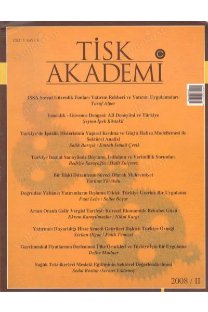Uluslararsı Göç ve Kalkınma Tartışmalarında Yeni Yaklaşımlar ve Türkiye
İçinde bulunduğumuz çağ, dünyanın çeşitli coğrafyalarında göç hareketliliğinin arttığı çağdır. Aslında göçler insanlık tarihi kadar eskidir. Küresel iletişim ve ulaşım olanaklarının gelişmesi, dünyanın yoksul bölgelerinde yaşayan insanları daha güvenli yaşayacakları ve uygun maddi olanaklara kavuşacakları ülkelere çekmektedir. Bu ülkelerin çoğunlukla demografik nedenlerle yabancı göçmenlere ihtiyacının olması göçmenler için teşvik edici niteliktedir. Bu gelişmeler ışığında son dönemde göç ve ekonomik kalkınma, geçmişte öncelikle ele alınan göç ve güvenlik kavramıyla birlikte göç tartışmaları nın gündeminde üst sıralara taşınmıştır. Bunda, küresel ekonomik gelişmelerin önemli bir rolü bulunmaktadır. Göç ve ekonomi bağlamında yeni tartışmalar genellikle işçi dövizlerinin önemini göz ardı etmeden dönüşümlü göç, göçmenlerin mesleki niteliklerinin ekonomik kalkınmaya katkı sağlaması ve diasporaların kaynak ülkelerle ekonomik ilişki içerisine girmelerini öngörmektedir. Tüm bu gelişmeler ışığında yurtdışında 5 milyon dolayında yurttaşı ve Türkiye çıkışlı soydaşı bulunan, aynı zamanda da yabancı göçmenler için bir çekim alanı haline gelmiş olan Türkiye’nin göç ve ekonomik kalkınma bağlamında yeni yaklaşımlara ve yapılanmalara ihtiyacı olduğu ortaya çıkmıştır.
Anahtar Kelimeler:
Türkiye
International Migration and Development
Our age is the era of growing migration mobilities in various parts of the globus. In fact migration movements are as ancient as the human history. Improvements in the global communication and transportation facilities attract the migration of individuals from the poorer regions to the wealthy parts of the world, where they can achieve secure and convenient living conditions. In the light of these recent developments, migration and development nexus together with security concerns of migration has been carried to the top of the agenda of migration discussions. Global economic changes play a significant part thereby. New discussions within the context of migration and development generally stress upon circulary migration, contribution of professional qualifications of migrants to economic developments and the economic interaction of the Diasporas with the countries of origin, nevertheless without neglecting the significance of the migrants’ remittances. In this context, it became obvious that Turkey with its nearly 5 million migrants of Turkish origin out of its boarders and as a country, which simultaneously attract foreign migrants, is in need of new approaches and structural measures with respect to migration and development.
Keywords:
Turkey,
___
- Abadan Nermin -Unat (2002), Bitmeyen Göç. Konuk İşçilikten Ulus ötesi Yurttaşlı ğa: Bilgi Üniversitesi Yayını, İstanbul.
- Abella, Manolo I. (2004), “Migration of the Highly Skilled: The Global Dimensions”, GTZ Deutsche Gesellschaft für Technische Zusammenarbeit (Hrsg.) (2004), Brain Drain or Brain Gain. The Migration of Elites. Berlin, S.8-10.
- Angenedt, Steffen (2007), “Zirkuläre Migration. Ein tragfähiges migrationspolitisches Konzept?” SWP-Aktuell April.
- Castles, Stephen (2008), “Comparing the Experience of Five Major Emigration Countries”, Stephen Castles and Raul Delgado Weis (Eds.), Migration and Development. Perspectives from the South, Geneva.
- Global Commission on International Migration (GCIM) (2005), Migration in einer interdependenten Welt: Neue Handlungsprinzipien. Bericht der Weltkommission für internationale Migration, Berlin.
- İçduygu, Ahmet (2006/2007), International Migrants Remittances in Turkey. Analytic Synthetic Notes. Demographic & Economic Module. CARIM-AS 2006/2007. European University Institute. Robert Schuman Centre for Advanced Studies (Şorence).
- IMISCOE (2008), Ties Across Borders: The Growing Salience of Transnationalism and Diaspora Politics. Policy Brief, No.13, October.
- IOM International Organization for Migration (2007), Republic of Turkey. Migration Profile, Ankara.
- IOM International Organization for Migration (2006a), Migration for Development: within and Beyond Frontiers, Geneva.
- IOM International Organization for Migration (2006b), International Migration and Development. Perspectives and Experience of the International Organization for Migration, April.
- Martin, Philip, The Economics of Migration. Managing the Flow of International Labor, http://hir.harvard.edu/articles/ print.php?article=1444.
- OECD (2008), International Migration Outlook: SOPEMI 2008 Edition, Paris.
- Rindoks, Aimee; Penninx, Rinus ve Rath, Jan (2006), IMISCOE Working Paper. Gaining from migration: What works in networks? Examining economically related benefits accrued from greater economic linkages, migration processes, and diasporas. 10 January 2006 (Report presented to OECD)
- Sontheimer, Michael (2008), Jung, gut und unerwünscht, SPIEGEL 21/2008 vom 19.05.2008.
- Türkiye Araştırmalar Merkezi (2007), Hollanda’da Türk Girişimciliği, Essen.
- ISSN: 1306-6757
- Yayın Aralığı: Yılda 2 Sayı
- Başlangıç: 2006
- Yayıncı: Türkiye Isveren Sendikalari Konfederasyonu
Sayıdaki Diğer Makaleler
Sabit Yatırım Harcamalarının Öncü Göstergeler Yöntemiyle Tahmini: Türkiye Örneği
Liderlik Tarzları ile Örgüt Kültürü Türleri Arasındaki İlişkiler: Bir Alan Çalışması
Psikolojik Taciz Davranışının Kamu Kurumları Arasında Karşılaştırılması Üzerine Bir Araştırma
Uluslararsı Göç ve Kalkınma Tartışmalarında Yeni Yaklaşımlar ve Türkiye
Beşeri Sermayenin Türkiye'de Bölgeler Arası Ekonomik Gelişme Açısından Önemi
Selahattin BEKMEZ, AYLİN ÇİĞDEM KÖNE, Derya GÜNAL
Üçüncü Kişinin Uğradığı Kazada İşveren Kusurunun (Taksirinin) Kapsamı
Türk Hukukunda Deneme Süreli İş İlişkileri
Avrupa Birliği Müktesebatı Işığında Alman Hukukunda Toplu İşçi Çıkarımına İlişkin Yasal Çerçeve
